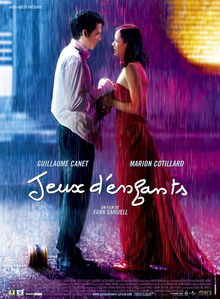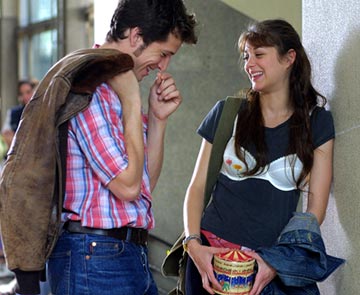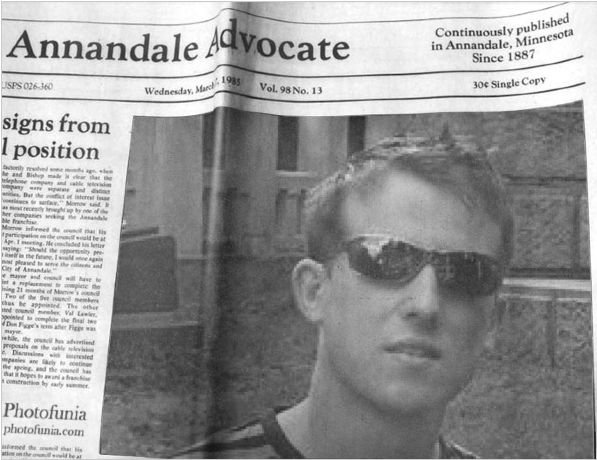Love Me If You Dare (French title: Jeux d'enfants — "Children's Games" in English) is a 2003 French film directed by Yann Samuell.
Plot:
The game begins when Julien (Guillaume Canet) and Sophie (Marion Cotillard) are children, but as they grow older they intensify and become more twisted and dangerous. Although they are in love with each other, the game of dare later dictates their future, and the dare even goes as far as hurting and tricking each other.
The overarching theme is of a struggle between childhood playfulness and the expectations of the adult world: the characters age significantly over the course of the film, and Julien is forced — several times — to pick between the pink–coloured world of fun represented by Sophie, or the expectations, demands, and successes of the adult world represented by his father and his eventual wife and children. Sophie, meanwhile, is content to live her life — as she puts it "a cream puff", becoming a trophy wife to a successful soccer player. Nonetheless, she keeps returning to Julien, despite her superficial satisfaction with what she has.

Imagery:
Keystone to the film is a small tin box in the shape of a carousel. In a flash–forward segment, the film opens with a shot of a construction site, with the box partially enveloped in concrete. Once we return to the present, we see Julien initially receives it from his mother, and upon seeing Sophie being mistreated by other children at school, presents it to her. He hopes she'll lend it back on occasion, but she demands he do something daring to prove he really wants it. Thereafter, the two are engaged in a playful rivalry: whoever has the box can force the other to perform a dare to get it back. A few examples of dares are Julien getting married, Sophie wearing her underwear outside her clothes, Julien stealing a car, them slapping an athlete at school, and ultimately, getting buried in concrete. The film ultimately ends with a nearly identical shot to the opening, with the box once again partially enveloped in concrete.
The film's visual style also reflects the setting: while Julien and Sophie are children, the world is slightly fuzzy, and everything is bright and colourful. As they grow older, the film becomes sharper, and the colour more realistic. In a hypothetical scene of the two as an elderly couple, the film again becomes fuzzy, but now has a definite sepia tint.
A romance:

Romance with a capital "R," French style, is at the heart of Love Me if You Dare, a sometimes exhilarating, sometimes frustrating movie that borrows stylistically from Amelie. It is about Julien and Sophie, two people who are totally in love with each other, yet cannot admit it to each other, and cannot quite admit it to themselves. It's a love that spans from childhood to the mid-thirties or so, and Love Me If You Dare jumps forward showing how the pair progress over time. It begins when Julien (Thibault Verhaeghe) consoles Sophie (Josephine Lebas-Joly, A L'Abri des Regards Indiscrets, Beautiful Mother) after bullies make fun of the fact that she is Polish. He gives her a toy carousel, and everything stems from there. The two develop a bond and a game; if Sophie has the toy, Julien must do whatever she dares him to, and vice versa. The two slowly grow up, closer than ever, and Julien (Guillaume Canet, Tell no one, The Beach, The Warrior's Brother) and Sophie (Marion Cotillard, La Vie en Rose, Big Fish, A Private Affair) make their dares even more extreme.
Their love is like an addiction. The dares become life threatening at times, and nobody, especially Julien's father (Gerard Watkins, The Wolf of the West Coast) approves. It becomes a hugely disruptive element in their live, enough for the two to dare not to meet for years at a time. Then, the movie will jump forward, and they will pick up right where they left off, their love stronger than ever. It meets even more resistance when both become married to other people. It is as if their dares to each other are ways to prove that they love the other person more than their spouse. For a while, there is something sweet about the antics of these two people. They will do anything for each other, and are hiding their feelings behind dares. At about the halfway point, director Yann Samuell ups the ante, and makes these dares extremely dangerous. Enough so that it feels like Sophie and Julien have death wishes. They are in committed relationships, and unable to truly express their love to each other, so they begin daring each other with cruel, almost sadistic games.
This is Samuell's first film. It is bright, colorful, full of happy music, and zips along quickly, adding to a sense of happy tension between the two. Cotillard and Canet are beautiful people, and their rapid aging (typically signified by different clothes and hairstyles) looks plausible enough. They make an appealing couple, and have wonderful chemistry together when they are not pissed at each other. There is a sense of fate looming over the horizon, and everybody in the film realizes this, but doesn't seem to want to take that extra step to make fate a reality. This wonderful feeling of anticipation gives way to dread when Samuell makes the film much darker. These two people who were so attractive seem less so, especially when their intentions become all the more malicious.
But then a really strange thing happens. Samuell takes things a step further, with an ending that could only feel at place in a French film. It is wonderfully romantic and sad at the same time, but manages to bring back the sense of inevitability that was present in the first part of Love Me If You Dare. It's an ending that seems to fit perfectly with the story, yet is completely unexpected. The uneven tone gives a sense of imbalance to the story, part of which is necessary, and part of which serves to distract the viewer.
If you want to watch this movie, click here
The first part is right here :

No comments:
Post a Comment